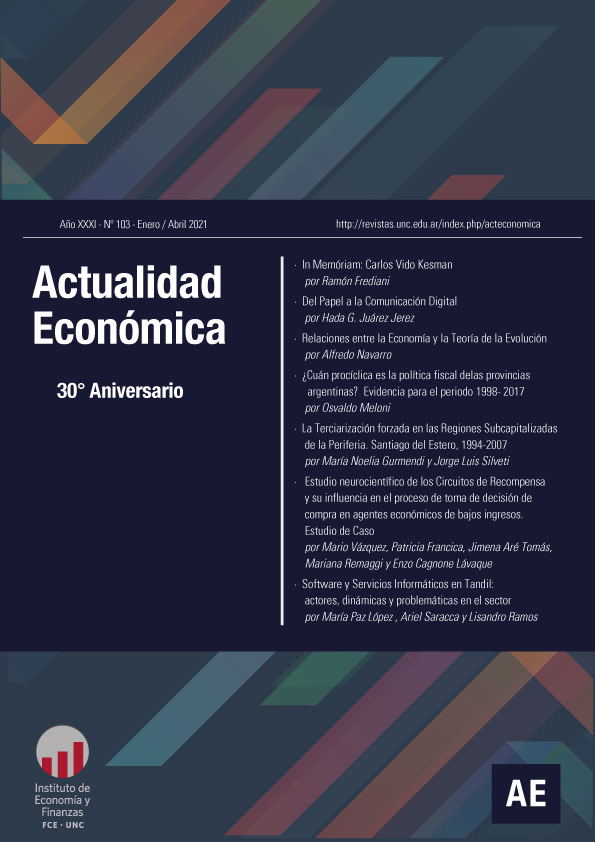Neuroscientist study of Reward Circuits and their influence in the decision making process of scarce economic resources agents. Case study.
Keywords:
Reward Circuits, decision, consumption, vicious circle of povertyAbstract
The aim of this paper is to identify the possible influence of the "Reward Circuit" on consumption decisions in individuals whose income is below the poverty line. This study was carried out by studying the consumption behaviour of a family with scarce economic resources in the city of Salta, during six months in 2018. It was possible to infer that the consumption that implied indebtedness and the consequent loss of purchasing power (key factors for remaining in a circle of poverty) are those that are aimed at obtaining goods in the process of which pleasure is experienced, or constitutes a pleasurable experience, which do not include obtaining and exhaustive analysis of information about the goods, and which possibly generates a dopaminergic segregation that triggers a consumption decision to satisfy various emotional needs, but which is unfavourable for the development of the family microeconomy.
Downloads
References
Bauer, P. T. (1975). “El círculo vicioso de la pobreza y la brecha creciente entre países: ideología y experiencia”. Cuadernos de economía 3.8 (1975): 411-425. Barcelona: CSIC. Centro de Estudios Económicos y Sociales; Universidad de Barcelona.
Desmet, PMA (2003). Medición de la emoción; Desarrollo y aplicación de un instrumento para medir las respuestas emocionales a los productos. En: MA Blythe, AF
Monk, K. Overbeeke y PC Wright (Eds.), Funología: de usabilidad al disfrute (pp. 111-123). Dordrecht: Kluwer Academic Publishers. Recuperado de https://studiolab.ide.tudelft.nl/studiolab/desmet/premo/
Easterlin, R. (2016). “Does Economic Growth Improve the Human Lot? Some Empirical Evidence”, disponible en http://graphics8.nytimes.com/images/2008/04/16/business/Easterlin1974.pdf
Francica, P. y Vázquez, M. (2018) Apuntes para la Cátedra de Neuropsicología. Salta: UCASAL, plataforma virtual (http://artes-y-ciencias.campusvirtual.ucasal.edu.ar)
Lewis, David. (2015). El cerebro vendedor. Cuando la ciencia es amiga del shopping. Madrid: Paidós.
Lousteau, M. y Campanario, S. (2014). Otra vuelta a la economía. Buenos Aires: Random House.
Maslow, A. H. (1991) Motivación y personalidad. Madrid: Díaz de Santos.
Motterlini, Matteo. (2014). Economía emocional. En qué nos gastamos el dinero y por qué. Madrid: Paidós.
Nurske, Ragnar. (1960). Problemas de formación de capital en los países insuficientemente desarrollados. México: F.C.E.
Pereiro Gómez, C. Ed. (2018) Manual de Adicciones para médicos especialistas en formación. Madrid: Socidrogalcohol. Disponible en http://www.fundacioncsz.org/ArchivosPublicaciones/243.pdf
Vázquez, M. y Francica, P. (2018) El hombre guionado - Principios de Análisis Transaccional (2da. ed. corregida y aumentada). Salta: EUCASA (Ediciones Universidad Católica de Salta).
Downloads
Published
Issue
Section
License

This work is licensed under a Creative Commons Attribution-NonCommercial-NoDerivatives 4.0 International License.
Those authors who have published with this journal, accept the following terms:
Authors will conserve their copyright and guarantee the magazine the right of first publication of their work, which will be simultaneously subject to the Creative Commons Attribution-NonCommercial-NoDerivative 4.0 International License that allows third parties to share the work as long as the author and first publication of this magazine are indicated.
Authors may adopt other non-exclusive license agreements to distribute the published version of the work (e.g., deposit it in an institutional telematic archive or publish it in a monographic volume) provided that the initial publication in this journal is indicated.
Authors are allowed and encouraged to disseminate their work through the Internet (e.g., in institutional telematic archives or on their website) before and during the submission process, which may lead to interesting exchanges and increase citations of the published work. (See The effect of open access)









